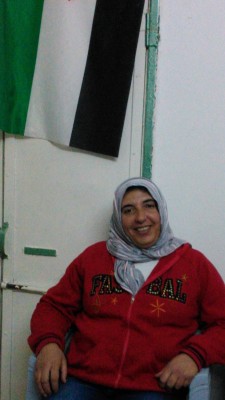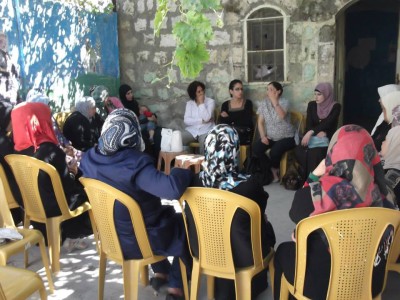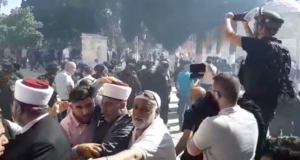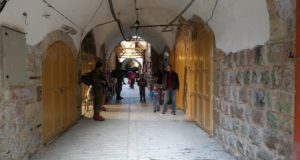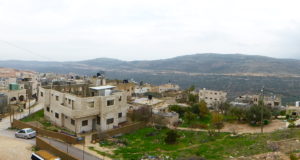6th December 2013 | International Solidarity Movement | Asira al-Qibliya, Occupied Palestine
Could you tell us a bit about yourself?
My name is Hakima Hasan Motlaq and I am from Asira al-Qibliya where I have always lived. It is south of Nablus and I’m 35 years old and I am married. I am the head of the village’s women and children’s resource centre, Retaj. This is a voluntary role. Our main aim is the empowerment of women across many fields, education, culture, and financial empowerment if we can.
Would you be able to tell us a bit about the village of Asira including some of the history?
Asira is a very old village with Roman ruins. So it dates back to the Roman age with a lot of evidence of the Ottomans being here as well. Some of the Roman ruins lie in the west of the village. The village lies 14 Km south of Nablus and is 6,440 dunams in its size. The population is 3,200. But 50% of the population are refugees of the 1948 war mostly coming from Haifa.
The economy of the village relies on agriculture especially olives, figs and almond trees. A few people work as employees of the Palestinian Authority (PA) or other groups, often NGOs. Other than this people work as builders or sometimes with cows and sheep.
Is there problems with unemployment or a lack of work in the village?
Yes. We have many graduates from the university and they have no chance of work even though they have graduated. Some young people are able to stay and work but others have had to move to Nablus or Ramallah as there is such little work in the village.
So my group Retaj have actively tried to help the women in particular who are struggling to find work. Many are stuck at home cleaning or cooking rather than living their lives. We have many workshops to help them and get them to improve themselves.
So obviously unemployment is a big problem for the village but what other sorts of problems is the village facing at the moment?
The water is a major problem. We don’t have our own water supply so we are forced to buy water in tanks for 140 shekels at a time. However in 2002 a project started with the water. Before we had our own water from local springs but the nearby settlement with the Israeli army took this for themselves. But yes in 2002 this project started but the Israelis have kept stopping and starting work ever since by withdrawing their permission for it to go ahead and then changing their minds again. Water is very expensive for us. A big family needs about two tanks a month.
Another problem is the dust which is caused by the quarry and lorries going to that quarry and back again. The pollution has caused children, and babies in particular, breathing conditions such as asthma.
We also don’t have somewhere to put our rubbish. A car comes once or twice a week but this is not enough especially in summer when the flies and smell becomes unbearable. Seven children are disabled which has been blamed by doctors on the pollution from the quarry when the mothers were pregnant.
Also, with the quarry the lorries come through the one road in the village and it’s very dangerous. We had a strike to try and stop them and said to the lorries that they could not pass. But the problem is that they need to work even if it is dangerous for the people. So yes the quarry is a also a big problem.
The school is also too far from the village. The children have to travel a long way as we don’t have buses to them. Especially in winter this is very difficult.
Wild pigs have also been a problem.
In Deir Istiya complaints have been made that settlers have released wild pigs to disrupt the olive farming, is that the same here?
Yes. The problems with the pigs have only been taking place in the last 2 or 3 years so we definitely think the settlers from Yizhar are behind it. They attack people’s gardens and where food is stored as well as the crops on the farmland. Another village near here found boxes of insects that were released onto the land and destroyed much of the olive harvest so this is something that the settlers have been doing in this area for a while.
It sounds like the village has many challenges facing it. But to make this all even worse you have disruption caused by the nearby settlers. But do the settlers ever come to the village itself?
The main problem we face is the occupation and the settlements. In the beginning the settlement had only 18 dunams of land that had once belonged to Asira. But now they have 1,800 dunams of land taken from 6 villages including Asira but also Burin, Madama, Huwwara, Urif and Einabus. But also they come to the villages up to 3 times a week at the moment. They burn cars, burn trees, burn crops. So we’ve had to stop planting crops nearby to the settlement as they always come and destroy whatever we plant.
When they come at night they are also causing a big problem for the children in particular. The children suffer from insomnia, bed wetting and their performance at school is worse all due to the psychological effects of this constant fear. Even when they play you can see it. They are always playing violent games like “settler and Palestinian” where they hurt each other. This is their favourite game and they pretend to shoot each other and all the parents are scared for their children and the psychological damage that is being done to them.
But even worse than this in recent times rather than just coming and throwing stones settlers have come with guns. Last year a man was shot in the head. We have a video of this incident. [Yizhar is considered the most violent settlement in the West Bank due to the number of reported incidents coming from there.]
So in the face of all these problems caused by the settlers what has the village done to try and make things better?
We can’t really do anything. But when they come the whole village comes and protects the houses at threat. This is to protect and support these people. Clashes between us and them happen all the time. But when we go to the court for these families the courts do nothing as they are Israeli courts. We are in a struggle with them [the settlers] all the time.
It sounds really difficult to do anything to directly stop this. But can you tell us some more about the women and children’s resource centre and the group Retaj that you are part of? What is the role they are playing in making things better for the village?
The idea we had for Retaj was to work with women with the help of other organisations. We created it this year on January the 14th and wanted to do something good for the village’s women and children. We currently have 70 members and have seven in our council which decides what we’re going to do and runs the group. I am the head of the organisation. The majority of the 70 women who are our members are housewives although some are younger university graduates. Our members who are housewives find that once the children have gone to school and they have done the housework they have nothing to do. So they come to Retaj. They want to improve and empower themselves as many of them left school at a very young age. They see education as a great way to do this.
We put on many workshops for them from stuff like pregnancy workshops, to healthy eating to help their children’s health but also workshops on First Aid as we don’t have a medical centre here in Asira. So now if anyone is injured, for example from the tear gas inhalation which affects the children particularly, the women in the village know what to do whether it is in the village or in her house specifically. Once women have finished the First Aid course they are given a bag of medical supplies so they really can make a difference. Recently a child hurt themselves falling over and one of our members got there and helped them until the ambulance came [ambulances are often hindered traveling to and from the nearest hospital in Nablus as two Israeli checkpoints lie on the route.] In fact this workshop has been so useful we do it for women and men now. Another incident saw a car accident happen in the centre of the village. A woman who had done the workshop managed to help out someone who was quite badly injured. This makes me happy as it feels like we are really doing something useful and positive.
So what other sorts of workshops do you do?
We do many other workshops, for example growing vegetables. They can then sell them and it gives the housewives a chance to earn some money for the family which helps a lot. I would say that for the woman in the family almost all the stress falls on her. The man leaves the house early in the morning and the woman is left with the children. She has to look after them and then cook and clean. Because she is in the house all day she is far more aware of the problems the family is facing whether it is fear of settler attacks, pollution or not having enough money. In fact the extra money that can be earned by selling vegetables can also help to put their children into the university.
We also have psychological workshops as well. They talk about the fears they have and what’s on their mind. A lot of the women really enjoy these workshops as they have a lot to say living where they do with such day to day problems.
We also have many widows and women whose husbands have left them. So they come to Retaj searching for a chance to earn money or just learn about herself by increasing her knowledge or culture. But we also do more practical workshops on women’s rights as many women are unaware that they have any. Many women do not get the land from their families that they are entitled to inherit. So we can offer women the chance to go to court and fight for this and support them when they are nervous as they are not use to these sorts of legal environments which are dominated by men.
So what does Retaj do for the children of the village?
We work with the children a lot as well. After school there is nothing for the children they are just in the street. This year 3 children have had accidents in the street with cars. One child now has a shorter leg, such was the extent of his injuries.
We do many workshops. We did one for art but it was only 2 weeks which wasn’t good as we need more long term courses and projects. So we have focused on English lessons as their English is very poor. We get about 60 children a week. We have three lessons a week for English.
Music lessons are also 3 times a week and we have over 60 children for this. Mostly playing the guitar but also singing as well. We took them to Ni’lin to a musical festival to perform with a London choir and also in Nablus with a French choir. So far we’ve also had two concerts in Asira.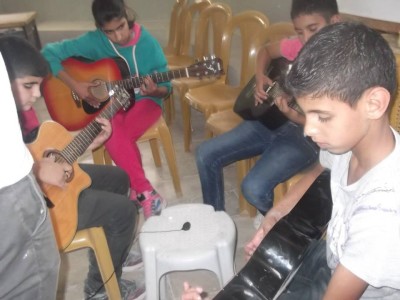
But now the music lessons have stopped as we don’t have any more volunteers until February. So we’ve been trying to think what we can do with them instead. Last week we went to the zoo in Qalqiliya for example.
They also do psychology workshops with the YMCA. They draw what they feel and we tend to focus this on children living closest to the settlement.
So who are the volunteers?
In English and music all the volunteers are international. Initially I did some English lessons but it was too much work as I have a lot of other things to do with Retaj. Then ISM and other groups started doing the English lessons.
But sometimes the psychology and art workshops are run by groups and individuals from Palestine.
And how are these projects funded?
We have no income source so everyone is a volunteer. We don’t want to have to ask the children for money we just want them to learn. Trips like the one to the zoo last week was paid for by the YMCA. We proposed to them that they do this and they were happy to and took 18 children on this trip.
But this is a problem with having a lack of money. The Retaj centre is a very old building that needs work. The building was in fact donated by a woman of the village for us to use. But yes it does need work. Some groups are happy to help including Première Urgence but they can’t fund the whole renovation.
As you come into the village you see that a water project is going on and you mentioned it briefly earlier. Can you tell us a bit about this?
It’s funded by U.S. Aid. It’s been carried out by a company from outside Asira so we have little to do with it. But it is very important for the village as water is so expensive. However I believe the village council has made a mistake with this project as we have so little involvement. Yesterday the company dug into the ground and there was no electricity for four hours.
But another issue is that the settlers attack it all the time. One time they burned down the room with all the equipment in it. On other occasions they have stolen materials and take the CCTV tape when they do this. Because of this the company wants the village to put a guard by the project at night but this would be very dangerous for someone as they would definitely be attacked.
For me I also find this difficult as it’s U.S. Aid funding it. The U.S. government protects Israel. It gives them arms. Not only this but they say we are guilty and Israel is innocent. We are terrorists and the Israelis are victims. The truth is that the U.S is lying and don’t care about us and whether we live or die. They give us small projects but give the Israelis money and guns to kill us. I boycott all U.S Aid projects and refuse to work with them. With this project in particular something is wrong anyway. When work started in 2002 the Israelis immediately took more land for the nearby settlement and said go ahead and have your water project. But when there is pressure on them to not take more land they oppose the water project. So only while we lose will they allow us this small project.
What does the future hold for Retaj and Asira?
We hope the future will be good for Retaj and the women and children of the village. We want to be involved with other projects that will empower people in the village. We hope that we can have a specific centre for the children to learn English and music but also do other things we haven’t done before like sports. We also want the children to learn how to perform dabke (a traditional Palestinian dance). We have started to meet other women from villages around Ramallah and Nablus who are doing similar things or want to start to. This looks like it might be really useful and we can share skills with each other. We have already helped some potential new groups with the applications they need to complete to become registered groups or organizations.
So yes, hopefully the future will be good for Retaj and Asira. Insha’Allah [if God wills it].
 International Solidarity Movement Nonviolence. Justice. Freedom.
International Solidarity Movement Nonviolence. Justice. Freedom.
